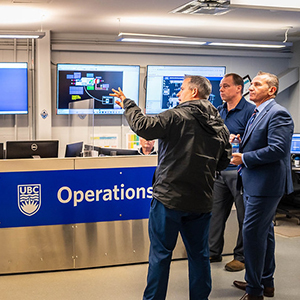Shared Goal
Protecting UBC information & systems is critical to fulfilling UBC’s vision purpose & values. We partner across the university to support units in identifying and meeting their information security responsibilities. Together we protect the UBC community from a major privacy or information security breach.

Program Overview
The Compliance Support Program exists to communicate essential controls, clarify accountability for securing information systems, and support units in understanding their gaps to be able to develop plans and processes to improve security. The program will be systematically engaging with units across UBC in waves. Administrative/Academic Heads of Units must work with the program to identify key stakeholders and allow time to enable their team to support the program.
The attestation will begin focusing on Administrative Heads of Units (both Academic and Administrative portfolios) and IT Representatives. IT Representatives are focal points to gather technical information on controls practiced by each unit, as appointed by each Administrative Head of Unit. In general, they will be the heads of IT departments, where those exist, or the next most suitable staff member to centralize the gathering of the required information e.g. a UBC IT Client Service Manager.

Participation Benefits
Participation benefits units by:
- Assuring that essential controls are in place, a clear path toward improvement and an opportunity to advocate for the support required to provide secure systems
- Communicating which information security controls are considered essential, helping clarify accountability for securing information systems, and supporting units in understanding their maturity to be able to develop plans and processes to improve security
Available Support
The Compliance Support Program exists to communicate essential controls, help clarify accountability for securing information systems, and support units in understanding their maturity so as to be able to develop plans and processes to improve security. It offers services including:
- Advice in relation to best practices, UBC support services and technologies are available to support improved maturity
- Attestation processes for Administrative Heads of Units and their IT Representatives to help surface any significant compliance gaps
- Continuous follow-up on key risks and mitigations identified

Go Further...
- How to complete the self-assessment using ISORA?
- Policy SC14- Acceptable Use and Security of UBC Electronic Information and Systems
- Information Security Standards Glossary
- Defining University Glossary Terms Office of the CIO
- How to protect personal information online
- Subdomain Registration
- Data Governance at UBC
- UBC’s How to Stay Secure
- Policy, Standards and Resources






